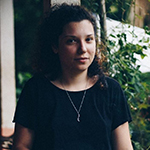I Like You
I like you
The way I like string theory
Wormholes
And white holes
Which are the opposite of black holes
And allow the universe to stay
In constant expansion
There is no practical
Proof whatsoever
That white holes exist
But did you know that a pair of
Subatomic
Particles like an electron and an antielectron
Act as though they were entwined
Telepathically
And all we would need is a computer
Bigger than the universe
And atoms of our body
Entwined with free atoms
For us to be able to teleport
Anywhere in the multiverse
I like you
The way I like the things
Man has yet to reach
Arrival
co-translated with Yasmin Nigri
like birds
who in landing
amputate the trees
i have not come because you are
the only company possible
i have not come because i get up
where you lie down
and we can say slowly
for lack of leaves
or smaller covers
all that suffocates us
our dry sleep
nor for this will we forgive
a single drop of dew
nor have i come because we have
sixteen hands between us
clouding this vision
that overruns everything
i have come because i love you
whether you save me
whether you savage me
translator’s note:
These poems appear in Yasmin Nigri’s debut collection Anvils, published by Editora 34 (São Paulo) in 2018. The bookis dedicated to women, especially Yasmin’s mother, whom she quotes, “I raised you alone in a misogynist world.”
“I Like You” is the first poem from the first section of “Yesterday’s Street,” which is composed of confessional poems that integrate memes, a discussion between a pedestrian and a reckless driver, reflections on being twenty-something in Rio de Janeiro, Rilke, and breath mints.
“Arrival” appears in the third section “Malevich Woman,”comprising poems about a relationship between two women, as well as personal and social observations which arose therein. These poems range from lyrical to erotic and humorous to meditative, and they address the turbulence of contemporary Brazil without allowing any form of negativity to eclipse the wonder of human relationships.
Translating these poems has been an eye opening and poetic experience. Communication with the author has been indispensable throughout. From the beginning, Yasmin encouraged me to “have fun” rendering these poems into English and take care that they read organically and did not sound as though they had been written in “translationese.” At one point, commenting on a line from a translation not featured here, she informed me that my translation had completely changed the meaning of the original, clearly explained the intended meaning of the text in Portuguese, remarked that the translation was interesting, and concluded by inviting me to keep it exactly as it was.
Whenever I localized memes or slang expressions at the expense of literal meaning, Yasmin’s comments were overwhelmingly in approval, and when I was perhaps overly worried about a technical aspect of a tricky line, her suggestions frequently leaned toward Gordian-knot type solutions, focusing not on what might be “lost in translation,” but rather on what stood to be gained by an essentially new rendition. Translating these poems into English and exchanging ideas thereon with their author has helped me grow as a translator. The experience was as enjoyable as it was challenging, so I can also say that I succeeded in having fun.
The process of translating the last line of “Arrival” explains why I have chosen to credit Yasmin as co-translator of this poem. In Portuguese, the final lines read:
vim porque te amo
e estou entre o céu e a corda
A possible “literal” translation might be:
I have come because I love you
and I am between the sky and the cord
Whether the “cord” is a tightrope, an executioner’s noose, or something else entirely is left open. In any event, the literal rendering above was my initial choice. When I shared the translation with Yasmin, she asked me to rethink the last line and look for an alternative that maintained the original effect, giving primacy to sound without focusing too much on the words present in the Portuguese. I was stuck. It was the first time an author had asked me to take that sort of creative liberty with their work, and no alternatives came to mind.
A few weeks later, Yasmin sent me an e-mail suggesting the two lines featured here as a solution. She told me they were from the song “Lioness” by Jason Molina, aka Ohia. My first step was to look Ohia up on Wikipedia. Like Jason Molina, I was raised in the Midwest Region of the United States. The record label Secretly Canadian, which released most of his recordings, is located in Bloomington, Indiana, where I happened to have completed my university studies, during which phase of my life I can say that I was “into” indie music. All that said, I’d somehow never heard of Ohia before.
I found the song on YouTube and listened to it a few times while re-reading the original text of “Arrival” in Portuguese. During this process, I sensed Ohia’s aesthetic approaching Yasmin’s (The final section of Anvils also contains a poem titled “Lioness”), and for a moment I found myself wandering around in that part of the mind where there are no borders between languages, experiences, and expression. In her e-mail, Yasmin told me she felt the lyrics were closer to the effect she wished to produce than the literal translation. And she asked my opinion. It was one of infinite solutions that would never have crossed my mind, and I loved it. Like all forms of art, this experimental practice in translation poses multiple beguiling questions, without necessarily answering or wanting to answer any of them.

Robert Smith’s translations of contemporary Brazilian poetry have appeared/are forthcoming in New Poetry in Translation, The Brooklyn Rail, InTranslation, and Two Lines. Photo by Luan Magno.

Yasmin Nigri (b. Rio de Janeiro, 1990) is a poet, visual artist, and essayist. Her first book of poems, Bigornas, was published by Editora 34 in 2018. Her works have appeared in literary journals in Brazil and Portugal and in the anthology 50 poemas de revolta (Companhia das Letras, 2017). She is currently completing a doctorate in Philosophy at PUC-Rio. She is a co-founder and member of Disk Musa, a collective of women poets founded in 2015, and a contributor to Revista Caliban. She also shares her video-poems and other experiments on her YouTube channel.

 BACK TO ISSUE
BACK TO ISSUE